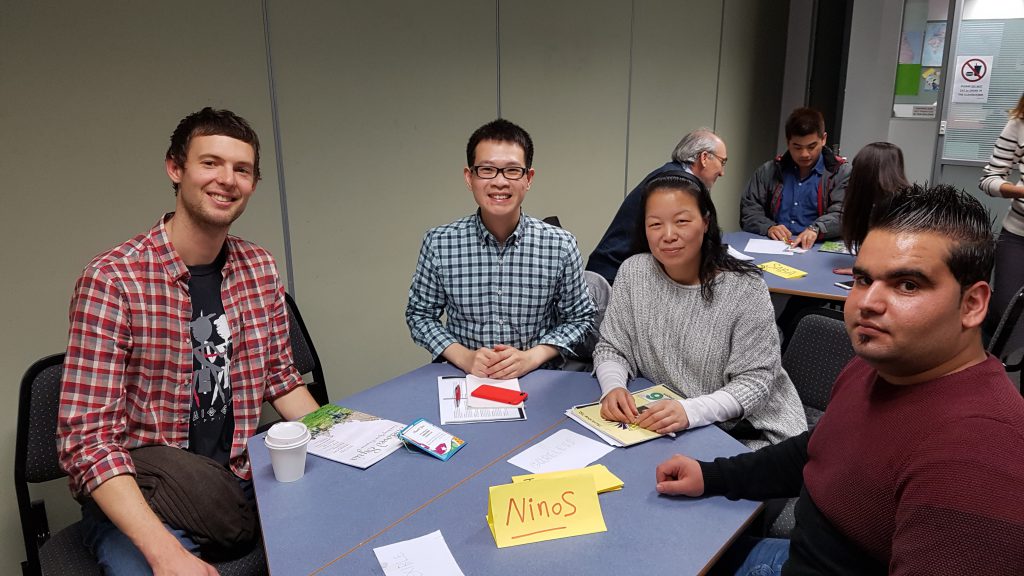– By Ninos Sawa
LEAVING BEHIND
It’s a sad feeling when you leave your home. I have left my home only physically. My heart and mind are still in Syria.
I miss my college, friends, and the house I grew up in. I hope it hasn’t been destroyed or bombed. I don’t have any information about it now.
THE REFUGEE EXPERIENCE
Refugees need to adapt here. They should learn English in order to integrate into the community, so they can communicate with others. The difficulty for some refugees is to find work or study that they did in their country. Unfortunately, they have a problem learning English as soon as possible.
Through the journey as refugees from Lebanon to Australia, we had some problems. In Lebanon, life was very hard for me. I was working 14 hours a day to exist, leaving my university studies behind me. There was no time for anything and I had no friends there. I felt isolated, but when I arrived in Australia, everything changed. I was born again. I started going to school to learn English. I made new friends. I have opportunities to do many things in Australia that I was deprived of in Lebanon.
Being a refugee doesn’t mean that you must give up on your dreams. The beautiful days will come in succession. My advice to myself is –
- always work hard to get what you want,
- never forget the country you grew up in,
- always smile and be optimistic.
WOMEN IN SYRIA
Let me be frank with you. Women in Syria are free and they can work in all fields of life, such as in schools and universities and government departments. They can even achieve senior government positions, just as Vice-President Najah Al-Attar has.
But sometimes customs and traditions impose certain restrictions on women that prevent them from doing many things freely. However, in general, if Syrian women are compared to Australian women, Syrian women are ‘75% free’.
A MOST BEAUTIFUL DAY
The most beautiful day in my life, a day I will never forget, was about two months ago, when some Syrian actors and a director came to Melbourne to introduce some Syrian films. At that moment, I smelt the soil of my country. I felt I was in Syria. It was an indescribable moment.
UNIVERSITY STUDIES
In English literature, as well as poetry, drama, translation and language, we studied four books: Anna of the Five Towns by Arnold Bennett, Hard Times by Charles Dickens, Moll Flanders by Daniel Defoe, and The Europeans by Henry James. My favourite author was Arnold Bennett.
One of the challenges that I faced was the length of the novels. It was the first time for me to read novels, poems and plays written in English. The good thing was we had a chance to speak English in the lectures, which was quite different to our experience of high school English classes.
Anyway, something that should be mentioned about studying in Syria is that we didn’t have to pay fees for our studies from the start of kindergarten until graduation from university.
SPORT
Honestly, I am passionate about sport. In fact, I am head over heels in love with it, especially football. I always play football in my free time and sometimes I go to the gym. Football for me is the air I breathe and I attribute this love to Barcelona and Lionel Messi – the best player in the world!
SONGS AND MUSIC
In general, I adore Assyrian singing. My favourite artist is Sargon Gabriel because all his songs are wonderful. They have a particular sound and they tend to be about love and romance. His songs can lead me to forget what has happened in my life and to feel that I am drunk on whisky.
SOURCES OF STRENGTH
I draw strength from being optimistic and from saying tomorrow will be beautiful and beautiful days will follow. I always smile.
LESSONS LEARNT
From life, I’ve learnt to fight for what I want and to never give up. And life is tricky.
Note, when I say ‘fight’, I don’t mean anything physical or violent. I mean ‘fight’ through working hard to get what I want.
AUSTRALIA AND SYRIA
Australia and Syria have many things in common. For example, both countries have welcomed refugees and they also respect their people, and there is a feeling of love and respect for others.
Other things we have in common include the great cultural and religious diversity and peaceful co-existence that is unparalleled in the world.
Note that when I say Syria is hospitable and good with refugees, I am thinking of how Syria received Iraqi and Lebanese refugees after 2003 and 2006 respectively.
DIFFERENCES BETWEEN COUNTRIES
In my opinion, the differences are just in the customs and traditions of each society. In the end, these are superficial things. The people are the same: people in both countries have displayed enormous generosity.
Ninos was a full-time student at AMES, Flagstaff, Melbourne
From ‘Beloved Syria – Considering Syrian Perspectives’, September 2017 edition
